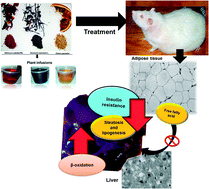Consumption of Ocimum sanctum L. and Citrus paradisi infusions modulates lipid metabolism and insulin resistance in obese rats†
Abstract
A high saturated fat and fructose diet leads to metabolic disorders through dysregulation of genes involved in lipid metabolism. Consumption of plant infusions reduces these obesity alterations, but the precise mechanism remains unclear. In this study, we investigated the effect and the possible mechanism of Ocimum sanctum L. (OS) and Citrus paradisi (CP) infusions in diet-induced obese rats. CP and OS infusions suppressed hepatic tissue fat accumulation, and significantly down-regulated the mRNA levels of two hepatic lipogenesis genes: sterol regulatory element binding protein 1c (SREBP1c) and fatty acid synthase (FAS) compared with the obese control. Treatment with these infusions up-regulated the hepatic expression of mRNA related to mitochondrial fatty acid uptake: peroxisome proliferator activated receptor alpha (PPARα) and the expression of carnitine palmitoyl-transferase 1a (CPT1a). Both infusions improved insulin resistance, with OS showing the major effect. Consumption of these infusions reduces the damage caused by free radicals, protecting hepatic lipids and proteins. Additionally, plant infusions increase activity of hepatic enzymes: glutathione S-transferase (GST), glutathione peroxidase (GPX), and catalase (CAT). Our results suggest that the effects of CP and OS infusions on lipid metabolism are related to the down-regulation of genes involved in lipogenesis, particularly for OS, and to the increase in lipid β-oxidation, especially for CP infusion. In conclusion, the consumption of these plant infusions is a feasible adjuvant therapy for metabolic changes induced by obesity.


 Please wait while we load your content...
Please wait while we load your content...